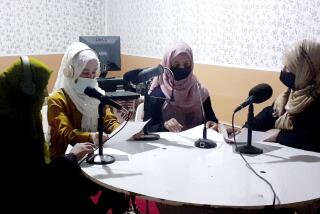Interest in Afghan Singer Renewed
- Share via
WASHINGTON — It’s been 20 years since Ehsan Aman last sang in Kabul, since he last watched Afghan teenagers swoon over his love ballads, dancing till dawn to his Eastern melodies. But right now, in his homemade basement studio in his Burke, Va., townhouse, Aman can close his eyes and imagine that scene once more: a living room in Kabul, the old tape deck hauled out of storage and one of Aman’s tapes popped in, a familiar tune once more lifting a family to its feet.
Aman, who has called Virginia home for more than half his life, who long ago became an American citizen, savors each news clip of Afghans celebrating liberation from the Taliban by turning up the music the repressive regime had banned.
Aman’s career as a pop singer was just blossoming in 1980 when the Afghan regime banned his songs as “anti-government” and ordered him to deliver pro-communist lyrics. Aman, then 19, a member of Afghanistan’s national tennis team and a recent graduate of Kabul University’s engineering school, felt cornered. He ran. After a 12-hour trek over the border, he reached Pakistan; within a year, he made it to Virginia.
Here, he has established himself as one of the top pop singers in the Afghan diaspora. His hits rank in the top 10 on sites such as afghanteens.net, and he is a highly sought performer at weddings and concerts in Virginia, California and other centers of Afghan exile life.
It hasn’t been easy making it as a performer in the relatively small Afghan community. Aman worked for nearly a decade as a civil engineer, singing and playing mostly on weekends. But for the past eight years, he’s devoted himself entirely to his art.
Last summer, his band--with his brother on guitar, his brother-in-law on bass, a German sax man and an American drummer--was making a big move toward a more international style, a combination of American blues and rock beats and the lilting rhythms of world beat music. Then, suddenly, everything went silent. After Sept. 11, Aman canceled his concerts, out of respect for the victims but also for fear that gatherings of Afghans might not be safe.
Now, however, as interest in things Afghan outweighs any animosity from other Americans, the band is gearing up to release its new album, “A Walk on the Other Side,” which will include English lyrics to go with the songs Aman usually sings in Persian. (The switch to English is not so problematic: Aman’s brother, an engineer in New Jersey who handles most of the lyrics, usually writes first in English, then translates to Persian.)
The new album will include songs inspired by the attacks and the war. “What a price to pay/for being away from home,” one song says, a line that speaks both of the victims of the terrorist attacks and of Aman’s pain at being forced out of his native land.
Aman’s songs are never overtly political; his lyrics tend more to the “let’s all get together and leave our differences behind” tenor. But he recognizes that there is more interest in his work now than ever. “I’m not trying to use the situation to gain fame, but the world can hear our message much more clearly now,” Aman says, shaking his mane of black hair as he marvels at the sudden media interest.
If his music does reach a non-Afghan audience, Aman wants to send a message about his Afghanistan, a place where Americans and foreigners were respected, where women went about town in the latest fashions from Paris, where kids like Aman took pride in attending coed classes and studying from U.S. textbooks.
“My town, Lashkargah, was known as Little America,” Aman says, “because it was so modern.” Aman’s wife, Sahar, who moved to Virginia when she was in the seventh grade, digs out old family photos from Kandahar, when it was not a dusty war zone but a place where her family sat on a well-tended lawn, the kids in jeans, her mother in a miniskirt.
When Aman was in college, Kabul was a city where you could see “Soylent Green” or “Star Wars” in the theaters, where women walked about unveiled.
That place is gone forever, but the Amans are eager to return, if only to play a concert or assist with reconstruction. “This is the first time in 22 years that we’ve had any real hope,” Sahar says. “We would go back to help, but not to live. It’s too long: Now this is home.”
More to Read
The biggest entertainment stories
Get our big stories about Hollywood, film, television, music, arts, culture and more right in your inbox as soon as they publish.
You may occasionally receive promotional content from the Los Angeles Times.










